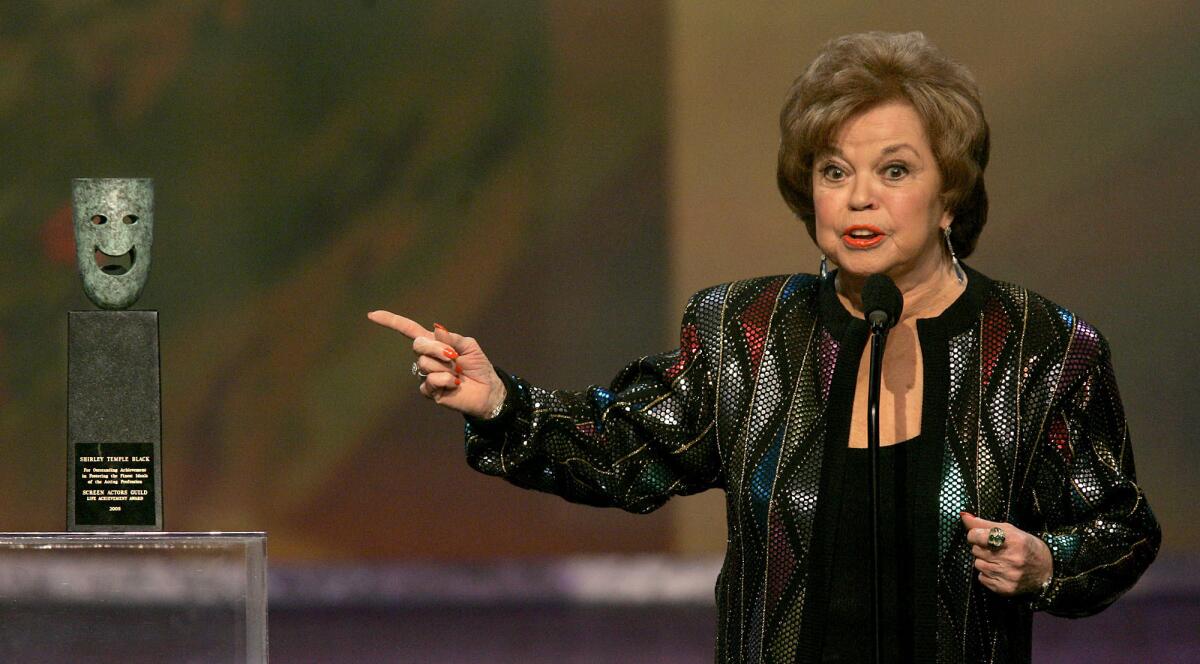Shirley Temple Black on her life: ‘Little Shirley helped open doors’

- Share via
In 2006, Shirley Temple was given the 42nd Screen Actors Guild Lifetime Achivement Award honor. A few weeks before she received the honor, the former child star talked on the phone from her home in Woodside, Calif. with Susan King about the award, and her life in Hollywood and afterwards.
When Shirley Temple Black walks onto the stage of the Shrine Exposition Hall on Sunday evening to receive the 42nd Screen Actors Guild lifetime achievement award for her movie career and humanitarian efforts, most of her young fans will probably be shocked to see she’s a 77-year-old grandmother.
Because of television, video and now DVD, a whole new fan base of children around the world is enjoying her musicals from the 1930s -- and they’re sending her bushels of fan mail, just as they did 70 years ago when the films were first released.
“My son takes care of [the email] because I am not very good with computers,” said Black by phone from her home in Woodside, in the San Francisco Bay Area. “I think a lot of them think I am about 6.”
Every Halloween, she dons a witch’s hat, wears a long, black dress and cackles loudly when she hands out candy to the trick-or-treaters. “They don’t get scared,” said Black. “But when I opened the door [last Halloween], one little girl said, ‘Who are you?’ And her mother said, ‘That’s Shirley Temple.’ The little girl said, ‘I didn’t know you would be so old.’ That kind of puts you in your place -- which is fine.”
Black was the youngest actress to receive a juvenile Oscar and the youngest to put her handprints in the cement at what was then Grauman’s Chinese Theatre.
The Santa Monica native began dancing at age 3, when her parents enrolled her at Ethel Meglin’s Dance Studio in Los Angeles, and she was discovered there by director Charles Lamont. At the ripe old age of 4, she made her debut in the short “What’s to Do?” and headlined a series called “Baby Burlesks,” in which she parodied the likes of Marlene Dietrich and Greta Garbo.
But her career really kicked into gear when she signed with Fox -- she made 10 movies in 1934 alone.
Black sang and danced her way to stardom in such films as “Bright Eyes” (in which she introduced “On the Good Ship Lollipop”), “Poor Little Rich Girl” and “Rebecca of Sunnybrook Farm.”
From 1935 to 1938, she was even Hollywood’s box office champ.
PHOTOS: Notable deaths in 2014
But Black, whose husband of 55 years, Charles, died last August [2006], doesn’t want to answer questions about her movies.
“All of these answers are carefully written out in the book,” her autobiography “Child Star,” she said politely but firmly. “It took me seven or eight years to finish.”
She retired from films in 1949 but briefly returned to Hollywood in the late ‘50s and early ‘60s to do the anthology series “Shirley Temple’s Storybook” and “The Shirley Temple Show.”
Politics occupied much of her adult life. She ran an unsuccessful campaign for Congress in 1967 and was appointed U.S. delegate to the U.N. by President Richard Nixon in 1969. She held ambassadorships through the 1980s.
Having recently completed the second volume of her memoirs, covering her life since 1968, she warms up to talking about that period. She became interested in politics, she says, because she got to meet politicians and dignitaries, who visited her on the set.
She was in Prague, Czechoslovakia, in 1968, on a volunteer mission to invite the government to join a multiple sclerosis organization she’d co-founded, when Warsaw Pact tanks entered the city.
RELATED: Seven biggest movie stories of 2013
She doesn’t remember being frightened. “I am very stoic,” she said. “I go through things very well. I drove a car [out of Prague] with lots of people in it and we had to go through soldiers with weapons drawn stopping us and checking us out. Then we would go on another few miles.”
In her career as a diplomat, “the U.N. was the biggest test,” she said. “I didn’t know that everybody was wondering how I would be. If I had, I might have been uneasy.” But she did her homework. “I read lots of books and studied a lot and got ready. At the U.N., I would take books back to my hotel and read until 2 in the morning and then get up at 7 and go back to work.”
But it was her old movies, she said, that really helped her gain acceptance into the United Nations.
“One of the reasons why it was fairly easy was because all of the countries felt they knew me already because they had seen me on the screen so long. As I said, little Shirley helped open doors, and if I didn’t perform the job I was given, the doors would have closed.”
More to Read
Only good movies
Get the Indie Focus newsletter, Mark Olsen's weekly guide to the world of cinema.
You may occasionally receive promotional content from the Los Angeles Times.











